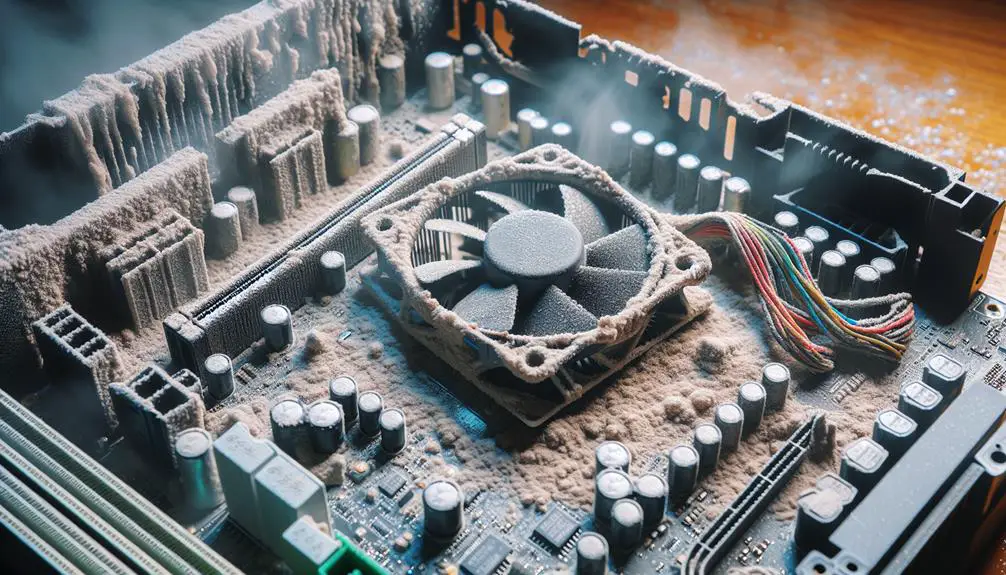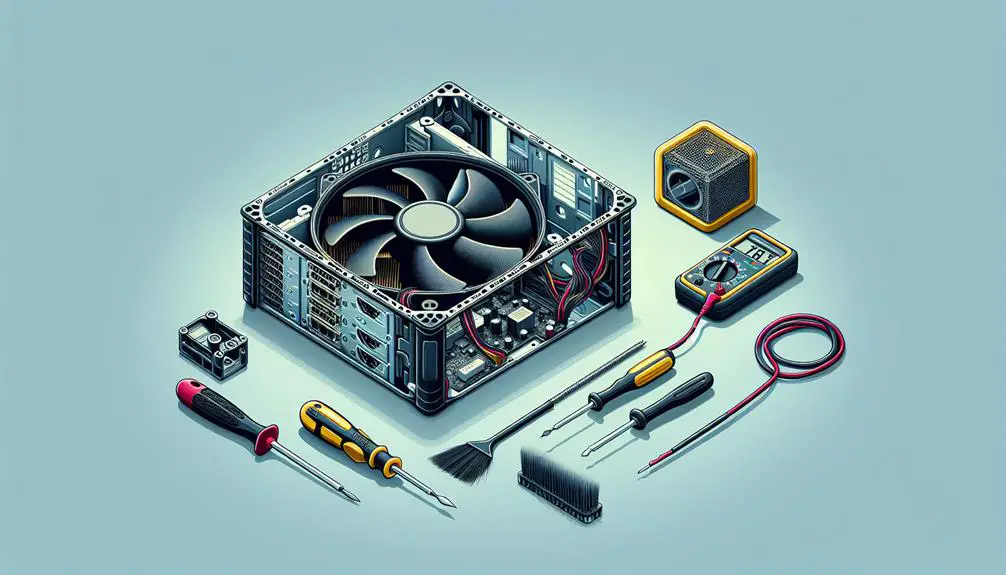If your computer's cooling fan stops working, it can lead to overheating.
This, in turn, can result in reduced performance and potential long-term hardware damage.
Immediate Overheating Risks

If your cooling fan stops working, your engine can overheat quickly, risking severe damage. This fan plays a critical role in maintaining your engine's temperature by pulling air through the radiator, especially during low-speed operations or when you're stuck in traffic. Without it, the heat generated by your engine won't dissipate into the atmosphere as efficiently, causing the temperature to skyrocket.
You'll likely notice the temperature gauge on your dashboard creeping up higher than usual. This is your initial sign of trouble. If you ignore it, the next thing you might experience is your engine running rougher than normal. This happens since the excessive heat affects the engine's ability to operate efficiently, altering fuel combustion rates and engine timing.
In the worst-case scenario, you could end up with a warped engine block or blown head gasket. Both are expensive repairs, and in some cases, it might mean your car is beyond economical repair. That's why it's critical to pull over and shut off your engine at the initial sign of overheating. Continuing to drive could turn a manageable issue into a costly nightmare.
System Performance Deterioration
Beyond immediate overheating risks, your car's system performance will start to deteriorate without a functioning cooling fan. You'll initially notice your vehicle struggling to maintain its usual power output. This happens as the engine can't operate efficiently under high temperatures, leading to reduced fuel efficiency. It's like trying to run a marathon in a heavy coat; your car has to work much harder to achieve what normally wouldn't be an issue.
You'll also experience inconsistent operation from your vehicle. For instance, the air conditioning system mightn't work as effectively, if at all, as it relies on the cooling system to function properly. This isn't just about comfort; it's about your car's general ability to control its internal temperature and operate smoothly.
Additionally, your car's engine might start to run at higher RPMs than normal to compensate for the loss of power. This doesn't just affect your driving experience; it increases your fuel consumption, meaning you'll be visiting the gas station more often than you'd like.
Without the cooling fan, your vehicle's performance doesn't just decrease; it plummets. And while you mightn't see this impact immediately, over time, the strain on your car will become increasingly apparent.
Potential Hardware Damage

While the initial signs of a malfunctioning cooling fan might be decreased performance and efficiency, the long-term consequences can lead to significant hardware damage in your car. It's important to understand that a cooling fan isn't just about keeping things cool for comfort; it plays a critical role in maintaining the health of your vehicle's engine and other components. Without proper cooling, your car's engine can overheat, leading to a domino effect of potential damage.
Here's a quick rundown of what might happen if your cooling fan stops working:
- Engine Overheating: This is the most immediate consequence. An overheated engine can warp, leading to costly repairs or even a complete engine replacement.
- Increased Wear and Tear: Components under the hood are designed to operate within specific temperature ranges. Excessive heat increases the wear on these parts, shortening their lifespan.
- Battery Drain: Overheating can lead to increased battery wear, as the system struggles to compensate for the failing cooling mechanisms.
- Transmission Failures: The transmission fluid can overheat, leading to transmission failure or damage, which is both an expensive and complex issue to resolve.
It's clear that the stakes are high, and addressing cooling fan issues promptly can save you from these expensive headaches.
Warning Signs to Recognize
Recognizing the warning signs of a failing cooling fan can save you from costly repairs down the line.
To start with, you'll notice your computer or device is overheating more frequently. It's not just working hard on a hot day; it's a consistent overheating, even during light use. This is your initial red flag. If your device feels hot to the touch or you're experiencing sudden shutdowns, it's time to pay attention.
Hearing unusual noises from your computer is another tell-tale sign. If the fan is struggling, you might hear grinding, rattling, or buzzing sounds. These noises indicate that the fan isn't spinning as smoothly as it should, possibly because of dust accumulation or wear and tear.
You might also observe a significant drop in performance. When your device overheats, it may throttle down its components to cool off, leading to sluggish response times and lagging applications.
To conclude, error messages related to the cooling system or CPU temperature warnings shouldn't be ignored. Your device's self-monitoring system is designed to alert you before things get worse.
Paying attention to these signs can help you catch a failing cooling fan before it leads to irreversible damage.
Steps for Troubleshooting

After noting the warning signs that your cooling fan may be failing, it's time to tackle the problem with some troubleshooting steps. You've observed the telltale signs—now let's roll up our sleeves and get to the bottom of this issue.
Here's a straightforward guide to pinpoint and potentially fix the problem:
- Check the Power Supply: Make sure that the fan's power source isn't the issue. It's simple but important. Sometimes the plug isn't fully inserted, or a circuit breaker has tripped.
- Inspect the Fan Blades: Look for any obstructions that might be preventing the blades from spinning. A quick visual inspection can reveal if there's dust build-up or a foreign object jamming the mechanism.
- Verify the Fan Motor: If the blades are clear but still won't spin, the motor might be burnt out or faulty. This requires a bit more technical knowledge to test safely.
- Consult the Thermostat Settings: Sometimes, the issue isn't with the fan itself but with the system's settings. Make sure the thermostat is set to a mode that activates the cooling fan.
If these steps don't resolve the issue, it's likely time to call in a professional. They'll have the tools and expertise to diagnose and fix the problem efficiently.
Conclusion
If your cooling fan stops working, you're in for some trouble. Overheating can happen fast, leading to sluggish performance and even serious hardware damage.
Make sure you're on the lookout for warning signs like unexpected shutdowns or loud noises. When you spot trouble, don't wait; delve into troubleshooting or seek professional help.
Remember, keeping your cooling fan in check is key to ensuring your system runs smoothly and stays healthy for the long haul.